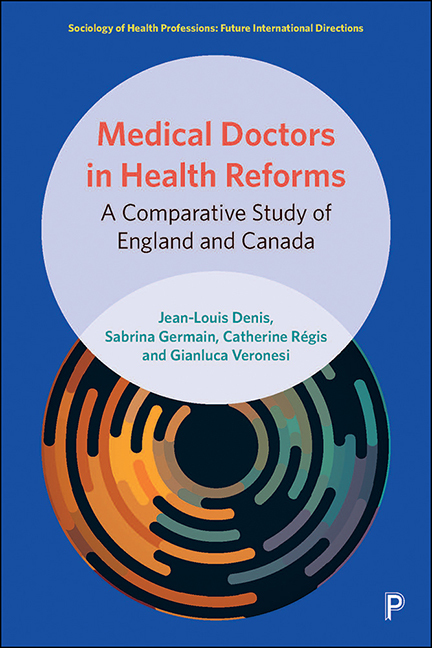Book contents
- Frontmatter
- Contents
- List of abbreviations
- Acknowledgements
- Preface
- Editors’ overview
- Introduction: Medical doctors and healthcare reforms
- 1 Theoretical framework
- 2 Research methodology: tracking the role of medical doctors in healthcare reforms
- 3 The role of medical doctors in healthcare reforms in two Canadian provinces
- 4 The role of medical doctors in healthcare reforms in the NHS in England
- 5 Comparative analysis
- 6 Discussion and conclusion
- Epilogue
- Appendix: Key constructs and related concepts
- References
- Index
Epilogue
Published online by Cambridge University Press: 15 September 2022
- Frontmatter
- Contents
- List of abbreviations
- Acknowledgements
- Preface
- Editors’ overview
- Introduction: Medical doctors and healthcare reforms
- 1 Theoretical framework
- 2 Research methodology: tracking the role of medical doctors in healthcare reforms
- 3 The role of medical doctors in healthcare reforms in two Canadian provinces
- 4 The role of medical doctors in healthcare reforms in the NHS in England
- 5 Comparative analysis
- 6 Discussion and conclusion
- Epilogue
- Appendix: Key constructs and related concepts
- References
- Index
Summary
As an epilogue, we completed this analysis just before the COVID-19 pandemic. We have since been able to observe the commitment and dedication of front-line clinicians, medical doctors and others healthcare professionals and workers in dealing with extraordinary and immense pressure to deliver care, often at considerable risk to their own health. In a sense, the commitment of medical doctors confirms one of the key findings of our study: the discrepancy between medical politics and the day-to-day accommodation between the medical profession and the healthcare system. It is self-evident that healthcare systems would greatly benefit if the dedication and willingness seen in clinical matters could percolate to policy level decision-making. This is the main reason we stress that joint policy-making is not just a responsibility of medical doctors, but also of governments that need to find a way to adequately mobilise medical doctors at a collective or policy level.
Beyond this, COVID-19 has become part of the distal context that could trigger policy shifts and radical healthcare reforms. This major public health crisis has created a significant burden on government finances, led to an important reorganisation of resources in healthcare systems – including the delay of essential care such as cancer treatments – and generated an extra burden on some healthcare professionals now facing increased fatigue and burnout (Denning et al, 2021; Gemine et al, 2021). It has also revealed how painfully inadequate healthcare systems have become in dealing with public health issues. In this sense, the pandemic has exacerbated vulnerabilities that were already present in the Canadian and English health systems, notably with respect to the elderly population living in long-term care facilities (Estabrooks et al, 2020; Hinsliff-Smith et al, 2020) and more vulnerable segments of the population such as minority ethnic communities, women and homeless people (National Housing Federation, 2020; Women and Equality Committee, 2020; Germain and Yong, 2021a; Henry et al, 2021). More broadly, it is clear that the effects of the pandemic have been most significant in communities that were already at a disadvantage due to structural inequalities (Health Foundation, 2020; Germain and Yong, 2021b; forthcoming). This COVID-19 context will undoubtedly leave a footprint on PFHS that we can currently barely fathom.
- Type
- Chapter
- Information
- Medical Doctors in Health ReformsA Comparative Study of England and Canada, pp. 183 - 187Publisher: Bristol University PressPrint publication year: 2022



